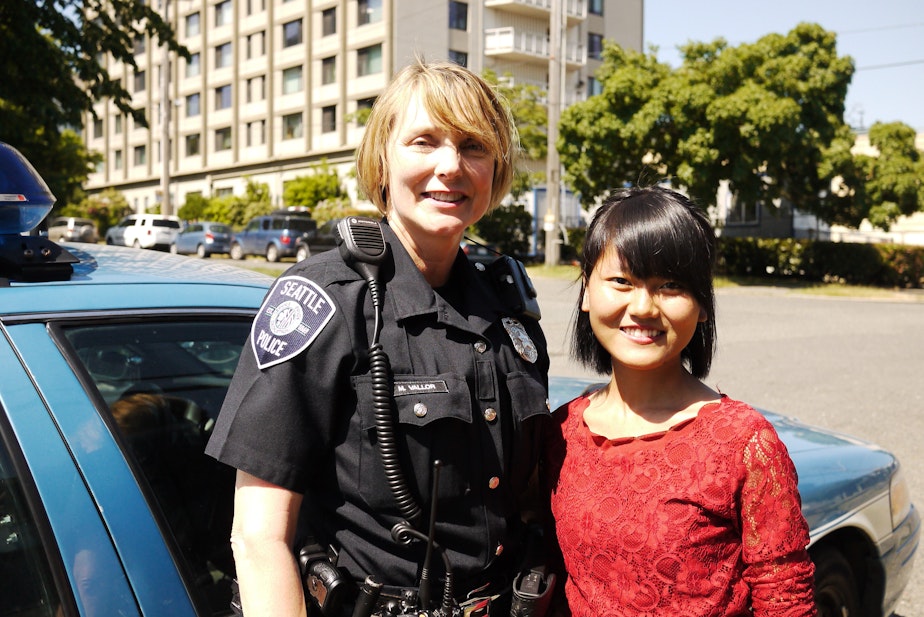Team Of Women: Female Cops And Refugees Work On Trust

Seattle police officers don’t get involved in immigration issues as a rule – but that doesn’t mean their relationship with refugees is easy.
The city wants to change that by bringing together officers and people who often avoid them – like Officer Michelle Vallor and 19-year-old Vung It.
On a recent afternoon, the two were in Vallor’s patrol car. It’s the last place Vung would have imagined herself a few years ago as a new immigrant.
Vung is originally from Myanmar, also known as Burma, one of Asia’s poorest countries, with an appalling record of human rights abuses and corruption. There, Vung said, nobody trusted the police.
“They would follow people to give them a lot of fine,” she said. “And sometimes they fine them extra for profit of their own.”
Sponsored
Vung and Vallor met months ago at the city’s Refugee Women’s Institute. The institute had brought together 40 women – half of them refugees, half of them police officers – for a series of eight Saturday mornings. There were women from Iraq, Somalia and Syria, among other countries. The goal: bridge cultural divides.
That program is what brought Vallor and Vung together as they walked through Vung’s neighborhood near Harborview hospital. Like many refugees, Vung said her fear of police stayed with as she began new life here in the U.S.
“I feel that police are there to take us back home or police are there to put us in jail,” she said. It took her a long while to shake that idea.
It can be even harder for people of her parents’ generation who speak less English. Other Burmese families often turn to Vung as an interpreter.
“One time I took parents to the emergency,” she said. “They called and I go with them. I think it’s like 3 a.m., I go with them because they don’t feel confident of calling the police.”
Sponsored
Finding Women Who Are Leaders
That’s partly why Vung was a perfect fit for the Refugee Women’s Institute. The city wanted to find young women like her who are leaders in their communities and can help introduce police to their communities in a better light.
As they walked through the area, Vallor said the training prompted her to try new approaches. Recently, she was called to assist an immigrant woman who was being harassed.
Vallor sensed that the woman was reluctant to talk, so she used a tip from the training and told the woman up front that Seattle police don’t get involved in immigration enforcement.
“She was relieved,” Vallor said. “Through her interpreter she said, ‘Thank you for letting me know that.’ And then she started telling me more of her story more freely.”
Sponsored
At the institute, the women talked about city and police issues. But they also just talked about their lives and families. Vallor, a 30-year veteran, said the institute was a rare and eye-opening experience for her.
“Getting to see each other face to face, it made a big difference for us,” Vallor said. “I would like to see other officers do it too.”
Vallor said she wants to see the training expanded. She would also like to have a training tailored specifically to people who are homeless or have mental illness – people she interacts with often.
From Distrust to Mother's Day Messages
Sahar Fathi, a policy analyst for the city and the force behind this pilot program, said she was anxious about whether it would work. Especially on the first day, when the refugees didn’t talk for two hours.
Sponsored
“When they did talk, it was usually something like, ‘The police don’t want to listen to us,’” she said. “‘They don’t care what we have to say.’ It was not great.”
By the end of the program, the refugees and officers were texting each other Happy Mother’s Day messages. Some even spent Thanksgiving together. The early results of the program have been promising. The women appear to have made lasting bonds and learned a lot about each other. Fathi said she hopes the city will keep the program going.
“I think people know that it was successful,” Fathi said. “The officers have been asking for similar iterations. For us, it’s just making sure the data supports that this is effective, and making sure we’re hitting the population with the needs that they have.”
The women have agreed to take this training back to their communities.
Vung, for example, gave presentations at her church and took a youth group to the 911 dispatch center. Seattle police will also release a video training drawn from the institute.
Sponsored
Back near Vung’s apartment on First Hill, some school kids hung out on a front patio. Officer Vallor stopped to chat.
“Hi, how are you? I wish I had some stickers,” she said as she checked inside her shirt pocket.
The kids just stared at her.
“Did you just get out of school?” Vallor continued.
The kids look skeptical.
“Yeah?” one asked.
Vung shot them a quiet smile, almost as if to say, “It’s OK, you can talk to her.”
Cautiously, they opened up – just a little.

